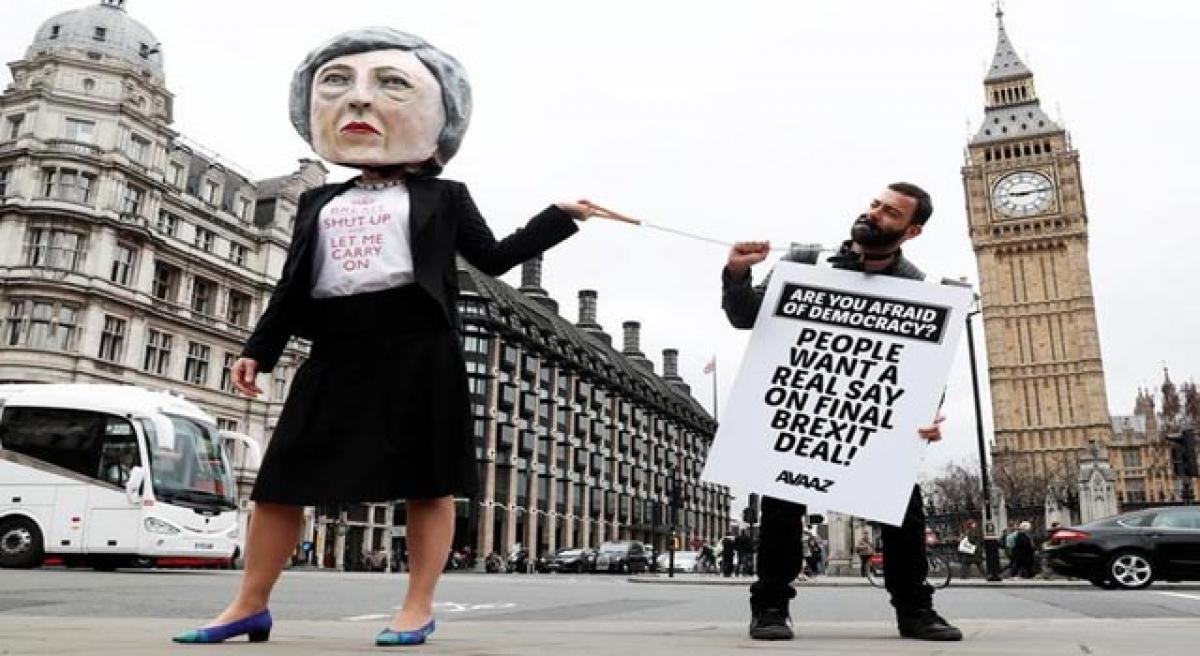Live
- ‘Get Set, Grow Summit 2024’ Focuses on Digital Detox for Families
- Stokes motivates his team to put in extra effort, says England pacer Potts
- From overcoming setbacks to leading India in U19 Women’s Asia Cup, Niki Prasad's amazing journey
- Driving Enterprise Security: Inside Venkata Reddy Thummala’s Leadership Journey
- Constitution debate: PM Modi hails 'Nari Shakti'; makes strong pitch for 'United Bharat’
- Abhijeet Bhardwaj: Revolutionizing Enterprise Analytics with Innovation and Expertise
- Bihar: Inquiry initiated against principal who went to buy veggies during school hours
- Press Sri Lankan Prez for release of Indian fishermen: TN Cong MP to EAM Jaishankar
- TN: DMK postpones executive meet due to heavy rains & Parliament session
- Porous silicon oxide electrodes can fix durability issues in batteries: Researchers
Just In

Leaving the European Union (EU) may transform Britain but it will also change the EU. Here\'s how: Where\'s the money gone? The Union\'s budget accounts for only 2 per cent of public spending in the bloc. But in the east, transfers from Brussels contribute a much bigger share - some 8 per cent of Poland\'s budget and nearly a fifth of Bulgaria\'s.
Brussels : Leaving the European Union (EU) may transform Britain but it will also change the EU. Here's how: Where's the money gone? The Union's budget accounts for only 2 per cent of public spending in the bloc. But in the east, transfers from Brussels contribute a much bigger share - some 8 per cent of Poland's budget and nearly a fifth of Bulgaria's.
Without Britain, Brussels will have about a sixth less to give to countries that are net recipients, setting up a fight between east and west over a 7-year spending plan from 2021. In the short term, there will also be a battle with Britain over what it owes on leaving. London may choose to keep paying for access to some key EU budgets, such as for research. But big accounts, like farm subsidies, could be in for radical review.
Friends left in lurch
Britain has used its 12 per cent share of EU votes to curb Brussels spending and push hard for free trade. Its departure worries smaller northern allies like the Nordics and Dutch. Poorer easterners, whose membership Britain championed, fret that Germany and France may stiffen barriers to their low-wage workforce or beef up EU federal powers which the ex-communist states dislike. Aspiring new members, notably in the Balkans, also lose an ally against rich westerners wary of further EU enlargement.
The 19 euro countries will lose a key block on their caucus power. They can now outvote non-euro states, but only just. A non-euro bloc led by Poland and Sweden would need major dissent among euro countries to prevent the euro zone from setting the EU policy. France becomes the EU's only nuclear-armed, veto-wielding UN Security Council member and loses a dogged opponent of its ambitions for more EU defence cooperation outside the US-led NATO alliance; defence is already back on Brussels' agenda.
Germany, ambivalent about being seen as dominating Europe by dint of its economic muscle and being home to nearly one post-Brexit EU citizen in five, is uneasy about how to maintain balance, notably with economically struggling co-founder France.
EU: A diminished force
The EU loses a hefty interlocutor with the United States and the wider English-speaking world. A historic diplomatic and military force, Britain's insight and influence with powers like China and Russia or in the Middle East have been useful to the EU. In Africa, a source of growing concern over migration, British aid budgets and other clout have played a key role.
London's tough line with Moscow has won it friends among the likes of the Baltic states and the Netherlands, which fear that a softer approach from France, Italy and, possibly, Germany will undermine a consensus for pressuring Russia with sanctions over its actions in Ukraine or for cutting dependence on Russian gas.
Vive Le Brexit?
Though under-represented in the staff of EU institutions, British officials over 44 years of membership have established a key role in senior positions as well as in the EU parliament. That will disappear as British citizens are shut out of EU jobs. Many governments, notably from smaller states, value what they see as a British approach to administration that is more pragmatic and laissez-faire than the more centralised, dirigiste tradition embedded in the French foundations of the Union.
Britain will leave one legacy likely to survive in the form of English as Brussels' working language, despite some hopes in Paris of restoring the prominence of French.
Survival game
Since the Brexit vote, EU leaders speak of a renewed unity among the remaining 27. Polls suggest popular support for the EU has broadly increased. But unity will be sorely tested by Brexit negotiations, with governments all having differing priorities. The unprecedented use of Article 50 of the EU treaty breaks a taboo and means invocations of an "indivisible Union" now ring hollow. Brussels will have to contend with more threats to quit, colouring decision-making across the board for years to come.
By Alastair Macdonald

© 2024 Hyderabad Media House Limited/The Hans India. All rights reserved. Powered by hocalwire.com







